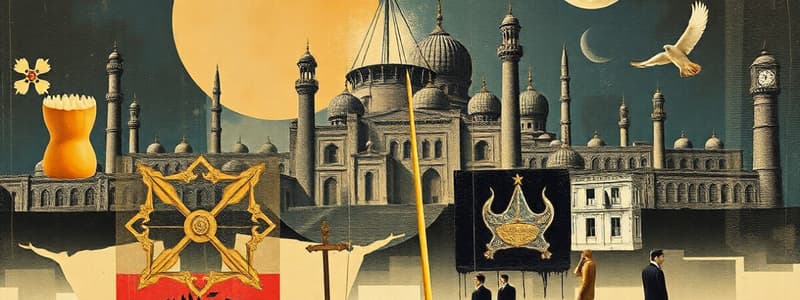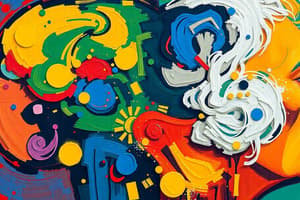Podcast
Questions and Answers
What was the impact of Ibn al-Haytham's work on scientific progress?
What was the impact of Ibn al-Haytham's work on scientific progress?
- He created the Arabic numeral system.
- He pioneered the study of algebra.
- He was the first to establish the concept of hospitals.
- He allowed for accurate planetary laws through atmospheric refraction. (correct)
What is the connection between the Qur'an and the pursuit of knowledge in Islamic civilization?
What is the connection between the Qur'an and the pursuit of knowledge in Islamic civilization?
- Islamic scholarship is primarily focused on legal texts.
- The Qur'an emphasizes the importance of reflection and understanding the beauty of creation. (correct)
- The Qur'an discourages independent thought.
- There are no references in the Qur'an regarding knowledge.
What was the main reason for the decline in Islamic science activity after the 11th century?
What was the main reason for the decline in Islamic science activity after the 11th century?
- The rise of technological advancements in Europe.
- The establishment of Western-style education systems.
- A decrease in patronage for scientific research.
- Increased religious conservativeness as exemplified by al-Ghazzali. (correct)
Why does the author prefer the term 'Islamic science' over 'Arabic science'?
Why does the author prefer the term 'Islamic science' over 'Arabic science'?
During which period did Islamic civilization reach its peak?
During which period did Islamic civilization reach its peak?
Which of the following best describes Al-Khwarizmi's contributions?
Which of the following best describes Al-Khwarizmi's contributions?
What is a misconception about the historical contributions of Islamic civilization regarding Greek heritage?
What is a misconception about the historical contributions of Islamic civilization regarding Greek heritage?
What was ultimately not the case about the first hospitals in relation to Islamic civilization?
What was ultimately not the case about the first hospitals in relation to Islamic civilization?
Who is referred to as 'the philosopher of the Arabs' and is considered one of the greatest minds of Islamic civilization?
Who is referred to as 'the philosopher of the Arabs' and is considered one of the greatest minds of Islamic civilization?
What primary factor contributed to the decline of Granada?
What primary factor contributed to the decline of Granada?
What is the significance of the term 'lingua franca' in this context?
What is the significance of the term 'lingua franca' in this context?
What is the historical significance attributed to al-Khwarizmi?
What is the historical significance attributed to al-Khwarizmi?
Which city was the capital of Andalusia before the emergence of the Taifa kingdoms?
Which city was the capital of Andalusia before the emergence of the Taifa kingdoms?
What was the role of Gerard of Cremona in the context of Arabic culture?
What was the role of Gerard of Cremona in the context of Arabic culture?
What event marked the end of the last Arab state in Andalusia?
What event marked the end of the last Arab state in Andalusia?
What impact did the ulama have on the Arabic language?
What impact did the ulama have on the Arabic language?
Which factor among the following was NOT considered to contribute to the decline of sciences in Islam?
Which factor among the following was NOT considered to contribute to the decline of sciences in Islam?
Who highlighted the significant role of the Arabs in the historical context of the West emerging from the Dark Ages?
Who highlighted the significant role of the Arabs in the historical context of the West emerging from the Dark Ages?
Which internal factor was cited as contributing to the decline of sciences in Islam?
Which internal factor was cited as contributing to the decline of sciences in Islam?
What does Nidhal Guessoum suggest as the primary reason for the decline of science in Islam?
What does Nidhal Guessoum suggest as the primary reason for the decline of science in Islam?
What was the last great work composed in Arabic in Europe, according to historical records?
What was the last great work composed in Arabic in Europe, according to historical records?
What was a consequence of the loss of Andalusia for the Arab population?
What was a consequence of the loss of Andalusia for the Arab population?
Which two caliphates were instrumental in challenging the Abbasid caliphate from the 10th century onwards?
Which two caliphates were instrumental in challenging the Abbasid caliphate from the 10th century onwards?
What significant shift occurred in power dynamics between the Christian and Islamic worlds from the 12th century onwards?
What significant shift occurred in power dynamics between the Christian and Islamic worlds from the 12th century onwards?
What event coincided with the decline of the Arab Islamic powers in Andalusia?
What event coincided with the decline of the Arab Islamic powers in Andalusia?
Which city served as the primary center for the translation of scientific texts from Arabic to Latin?
Which city served as the primary center for the translation of scientific texts from Arabic to Latin?
Which philosopher's rise is believed to have resulted in the decline of sciences in the Islamic world?
Which philosopher's rise is believed to have resulted in the decline of sciences in the Islamic world?
What is true regarding the educational system in medieval Islamic society?
What is true regarding the educational system in medieval Islamic society?
What is stated about scientific progress in the Arabic and Islamic world after the 13th century?
What is stated about scientific progress in the Arabic and Islamic world after the 13th century?
Which statement about Gerard of Cremona is accurate?
Which statement about Gerard of Cremona is accurate?
Which of the following was NOT a contributing factor to the decline of Arab scientific knowledge?
Which of the following was NOT a contributing factor to the decline of Arab scientific knowledge?
What did Petrarch's final remarks in the documentary convey?
What did Petrarch's final remarks in the documentary convey?
What significant role did the ulama play in society during their historical context?
What significant role did the ulama play in society during their historical context?
Who was responsible for creating modern algebra as per the content provided?
Who was responsible for creating modern algebra as per the content provided?
Which of the following contributions is attributed to Ibn al-Nafis?
Which of the following contributions is attributed to Ibn al-Nafis?
What was the purpose of the Madrasa created at the end of the 11th century?
What was the purpose of the Madrasa created at the end of the 11th century?
What city was known as the most civilized in Europe during the 10th century?
What city was known as the most civilized in Europe during the 10th century?
Which famous musician from Baghdad was instrumental in establishing Europe’s first music conservatory?
Which famous musician from Baghdad was instrumental in establishing Europe’s first music conservatory?
What was the significance of the Azhar in the context of education?
What was the significance of the Azhar in the context of education?
What happened to many Arab virtues after their expulsion from Spain?
What happened to many Arab virtues after their expulsion from Spain?
Flashcards are hidden until you start studying
Study Notes
External Factors that Contributed to Decline of Science in Islam
- The Crusades, the Christian reconquista of Al-Andalus, and the Mongol destruction of Baghdad are considered external factors that impacted the decline of science in Islam.
Internal Factors that Contributed to Decline of Science in Islam
- The rise of orthodox theology under Al-Ghazali (d. 1111).
- The lack of institutionalization of scientific culture, which was at the whim of the caliphs.
- The absence of genuine universities or institutions of higher education with autonomous status.
Reasons for Decline of Science in Islam
- A mixture of internal and external factors likely contributed to the decline of science in Islam.
The Reconquista
- The Reconquista (meaning "reconquest" in Spanish) refers to the Christian reconquest of the Iberian Peninsula from the Moors (Muslim rulers).
- The Reconquista was followed by the capture of Al-Hambra.
- The Reconquista led to the persecution of Arabs and Muslims.
Loss of Andalusia
- The loss of Andalusia to King Ferdinand II of Aragon and Queen Isabella of Castille was a major turning point in the history of the Islamic world.
"From Arabic to Latin" Documentary
- This documentary illustrates how the knowledge discovered by Arabs was translated into Latin and influenced the European Renaissance.
- The 12th century saw a power shift between the Christian and Islamic worlds.
- Kitab-al-Shifa, written by Ibn Sina, was translated into Latin for use by Europeans.
- The main center of scientific translation from Arabic to Latin was Toledo.
- Gerard of Cremona was a prolific translator in the 12th century.
The Arab Influence on Europe
- The film "Forgetting the Arabs" highlights how Europe asserted itself by excluding Arab culture.
The Rise of Madrasas and Islamic Religious Sciences
- By the end of the 11th century, madrasas were established in the Islamic world.
- Madrasas primarily taught Islamic religious sciences.
- Al-Ghazali graduated from and taught in the madrasas.
- They were established by the Seljuk Turks.
The Importance of Knowledge and Scholarship in Islam
- The Quran and Hadith emphasized the importance of knowledge and encouraged reflection on creation.
- Muslims were driven to observe and seek to understand God's wisdom behind all things.
"Ulema and Philosophers" Documentary
- This film highlights the conflict between the ulama (religious scholars) and philosophers in the Islamic world.
- The ulama played a role as mediators between those in power and the people.
- They sometimes led rebellions against those in power and sometimes sided with them.
- The fight for influence between philosophers and ulama lasted from the 9th century AD to the end of the 12th century AD.
"The Density" of Major Scientists
- The 10th and 11th centuries were marked by a "density" of significant scientific achievement.
Key Figures and Contributions
- Ibn al-Haytham: An influential figure in optics who corrected atmospheric refraction for more accurate astronomical data.
- Al-Khwarizmi: The inventor of algebra and the concept of algorithm. He introduced zero to the West.
- Ibn Sina: Author of "The Canon of Medicine," a medical encyclopedia.
- Al-Zahrawi: A prominent surgeon from Muslim Spain.
- Al-Razi: Considered the greatest medical authority in the Islamic civilization.
- Ibn al-Nafis: Discovered the minor blood circulation.
- Al-Kindi: Known as "the philosopher of the Arabs," widely recognized as one of the greatest Islamic minds.
Andalusia
- Andalusia, a Muslim-controlled region in Spain, was a hub of scientific advancements and artistic creativity, especially during the Umayyad dynasty.
- Cordoba, the capital of Andalusia, was also the most civilized city in Europe by the 10th century.
- Madinat al-Zahra, a palace-city built by the Umayyad Caliph Abd al-Rahman III near Cordoba, was a testament to their cultural and architectural prowess.
- Granada was the last Arab kingdom in Andalusia, falling to the Christians in 1492.
Bayt al-Hikma
- Bayt al-Hikma, established in Baghdad by the Abbasid Caliphs, was a renowned center of translation and learning that played a crucial role in preserving ancient Greek texts.
- It was not established by the Fatimids in North Africa.
The Legacy of Islamic Civilization: Impact on Europe
- The "translation movement" started during the Umayyad caliphate and expanded rapidly during the Abbassid period.
- The medieval Islamic educational system, relying mainly on madrasas, was not as influential on the development of science as some believe.
- Europeans learned paper-making from Muslims.
Key Takeaways
- The decline of scientific output in the Islamic world was a complex event with both internal and external contributing factors.
- The Islamic world was a major contributor to the development of knowledge and provided the foundation for many modern scientific discoveries.
- The legacy of Islamic civilization continues to influence our world.
Studying That Suits You
Use AI to generate personalized quizzes and flashcards to suit your learning preferences.




